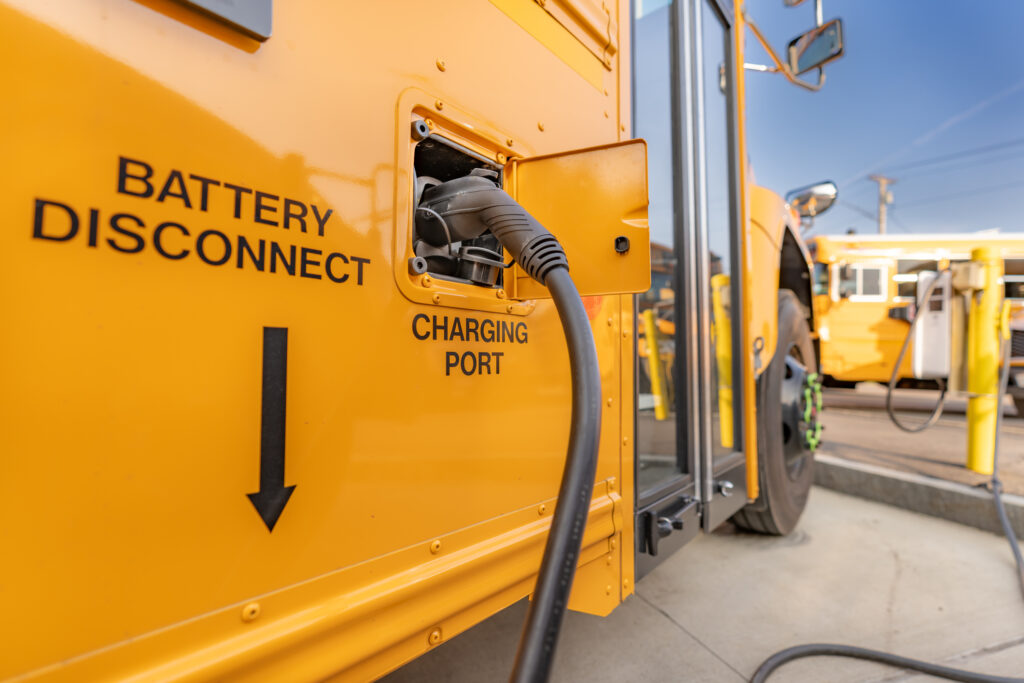On September 28, the Environmental Protection Agency (EPA) released the newest round of funding for its Clean School Bus (CSB) Rebate Program. This rebate program offers school districts, Tribal organizations, and eligible contractors the opportunity to replace existing school buses with clean and zero-emission models.
The Electrification Coalition’s (EC) key takeaways from the Notice of Funding Opportunity include:

- Goal: This rebate aims to support the replacement of existing diesel buses with zero-emission models. There is $500 million in total funding available for 2023.
- Applicants may request up to $20,000 per bus in additional funds for ADA-compliant replacement buses equipped with wheelchair lifts.
- Districts in Alaska, Hawaii, Puerto Rico, U.S. Virgin Islands, Guam, American Samoa, and Northern Mariana Islands, or third-party entities applying on their behalf, can be awarded up to an additional $20,000 per bus for increased shipping costs if selected for funding.
- Eligible Applicants: Local and state public school districts or public charter school districts, as well as Indian Tribes, Tribal organizations, and Tribally controlled schools, are eligible. School districts that contract out bus services to a private fleet are still eligible to apply.
- Eligible Vehicles: Operational diesel-powered buses with a gross weight of 10,001 pounds or more and a model year of 2010 or older are eligible and will be scrapped if selected. If a fleet has no eligible 2010 diesel buses, 2010 internal combustion buses or 2011 or newer buses may be scrapped.
- Eligible Infrastructure: Funding is available for costs related to infrastructure installation and equipment from the electrical meter to the charging port of the bus. Funds may not be used for work in front of the electrical meter.
- Due Date: Applications are due January 31, 2024, at 4 p.m. ET, using EPA’s Clean School Bus Rebate forms.
- Cost Share: There is no cost share requirement. Eligible applicants can earn up to $345,000 per bus/charging infrastructure in awards, based on the replacement requested.
- Funding Stream: Vehicles purchased using awarded funds may not be subsidized with other federal funds. Awardees may still use the Commercial Clean Vehicle Credit and the Alternative Fuel Vehicle Refueling Property Credit.
- Previous Applicants: Those who applied for previous CSB funding are able to apply again, so long as they still meet eligibility requirements. Applicants on the 2022 CSB Rebate waitlist must reapply for this program.
- Application Preference: The EPA will give preference to applications that will replace buses serving high-need local education agencies, rural areas, tribal school districts funded by the Bureau of Indian Affairs, and public school districts receiving basic support payments for students living on Tribal land.
- Award Designation: The EPA anticipates it will announce selectees by February 2024. The anticipated deadline for awardees to receive new buses and infrastructure and close out is February 2026.
Please reach out to the EC team at infrastructure@electrificationcoalition.org with any questions.
*All EV related projects will be subject to the minimum standards set forth Title 23, Code of Federal Regulations (CFR), Part 680, as well as the Build America, Buy America provisions of the Infrastructure Investment and Jobs Act.
